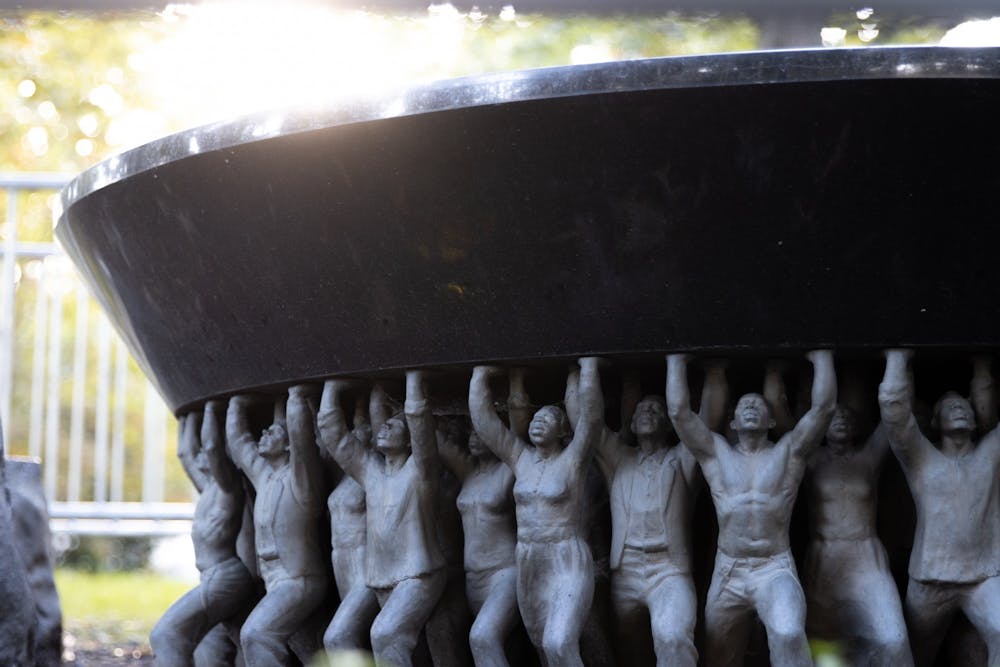Members of the University Commission on History, Race and a Way Forward discussed the UNC Land Acknowledgment project at their Monday meeting.
The University issued a proclamation in October that recognized that campus was built on the land of the Occaneechi, Shakori, Eno and Sissipahaw peoples, but an official land acknowledgment has not yet been received.
The University's proclamation also recognized the second Monday in October as Indigenous Peoples’ Day.
The commission spoke about the Barbee Cemetery and the Unsung Founders Memorial and provided updates on the Universities Studying Slavery Symposium.
What’s new?
- According to co-chairperson Jim Leloudis, the commission is continuing to work with a variety of stakeholders on the Land Acknowledgment project, which recognizes the land and sovereignty of Native American and Indigenous students, staff and members of the University community.
- Leloudis said that he and co-chairperson Patricia Parker attended a meeting hosted by Vice President of the Carolina Indian Circle Zianne Richardson last week.
- "The primary takeaways from that meeting were (that) we heard a strong emphasis on points that were made in the earlier conversation with the (First Nations Graduate Circle)," he said, "And that was to remind us of the importance, in this part of our work and in the document that we produce, to acknowledge this story is one that involves not only the past, but the present."
- Leloudis also said that students have voiced the importance of the University taking responsibility to teach local and UNC history in regards to the land acknowledgment.
- Parker said that there was a call from students for a physical marker of the land acknowledgment on campus.
- “Maybe part of that other work is having a place to go and reflect on the history of the land and the meanings that we’re trying to excavate in terms of the meaning of that history and the disposition of the land,” Parker said.
- Committee members discussed having the physical marker near the Old Well or near the quad, but the decision would not be made until a new director of the American Indian Center is appointed.
- Right now, Parker said the commission is focused on having community conversations and drafting the language of the land acknowledgment. The draft will be shared with the new center director and the director of the N.C. Commission of Indian Affairs, she said.
- “The land acknowledgment, the way I've used it and the way I understand it as I've thought about it in my own work, is really a starting place — an acknowledgment of historical injustice to be able to move forward, rather than a simple sort of commemoration,” Dr. Giselle Corbie, a Kenan Distinguished professor of social medicine, said.
- Leloudis gave an update on the ground-penetrating radar survey at the Barbee Cemetery. The cemetery project honors approximately 100 burial sites of enslaved people. Leloudis said that Lorie Clark, a Barbee descendent, and her family were recently given the opportunity to see a presentation of the technology’s newest findings.
- “If you look at the archeological survey that was done, it categorized likely burial sites on the property in degrees of certainty," Leloudis said. "And if you back out the sites that the archaeologists were least certain about, you end up with almost exactly the same number of sites identified by the ground-penetrating radar survey."
- According to Parker, a presentation of the report will be discussed next Friday with the descendants of the families and University representatives.
- Parker said that commission members will meet with Director of the N.C. African American Heritage Commission Angela Thorpe to further discuss the Unsung Founders Memorial and frame community conversations.
- Parker hopes the conversation with Thorpe will center around building an African American heritage site and engaging the community and other designers in the design process.
- Parker also gave updates on the Universities Studying Slavery Spring 2022 Symposium that was hosted by Guilford College and Wake Forest University from March 30 to April 1.
- The Universities Studying Slavery consortium is dedicated to research, acknowledgment and atonement about institutional ties to enslavement, slave trade and enduring racism in school history and practice, according to their website.
- According to Parker, UNC will be hosting the spring conference in 2023.
How did the commission start?
- The University Commission on History, Race, and a Way Forward was founded in 2019 to engage with and provide education on the University’s history with race. The commission offers recommendations to the Chancellor on reckoning and acknowledging the past.




